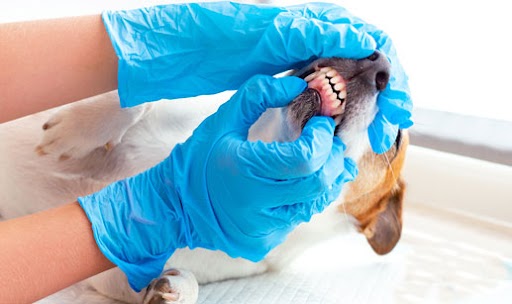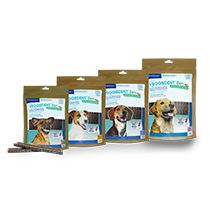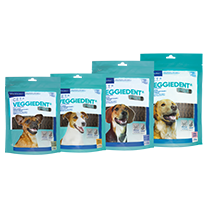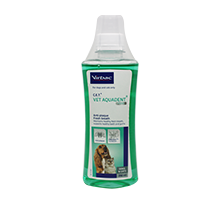
Make your pet’s oral hygiene a priority
Our beloved furry friends bring us so much joy and companionship, but it's important not to overlook a crucial aspect of their overall well-being—dental health. Taking care of your pet's teeth is just as vital as any other aspect of their health.
In this blog post, we will explore the importance of pet dental care, common dental problems, symptoms to watch out for, and how to prevent oral diseases in your furry companion.
Pet Dental Facts:
Before diving into the details, let's take a look at some important facts about pet dental health:
-
Approximately 70% of pets experience periodontal disease by the age of three.
-
Bad breath is not normal for pets and can be a sign of dental problems.
-
Dental issues are not always obvious and require careful attention.
Dental Problems That Could Affect Your Pet's Health:
Several dental problems can impact your pet's overall health. Recognizing these issues is essential for providing timely care. Here are some common dental problems to watch out for:
-
Broken or loose teeth
-
Extra or retained baby teeth
-
Discoloured or tartar-covered teeth
-
Inflamed or bleeding gums
-
Regression of the gum line
Common Dental Conditions in Dogs and Cats:
Understanding the common dental conditions that can affect your pet's oral health is crucial. Here are some of the most prevalent dental issues:
-
Plaque: This sticky mixture of bacteria, saliva, and leftover food particles can lead to more severe dental problems. It sneaks onto your pet's teeth within a few hours after a meal and can cause serious dental problems if left untreated. If the plaque isn't removed through regular brushing or dental care within 24 hours, it begins to harden. This hardening process occurs when the minerals in your pet's saliva combine with the plaque, forming a tough substance known as tartar or dental calculi.
-
Dental calculi: When plaque hardens and accumulates on your pet's teeth, it forms calculi, which can contribute to gum disease. Dental calculi requires professional cleaning by a veterinarian to remove it. Left untreated, it can lead to gum disease, bad breath, tooth decay, and even tooth loss.
-
Periodontal disease: A condition characterized by infection and inflammation of the tissues surrounding the tooth, collectively known as the periodontium. The periodontium includes the gingiva (gums), cementum (covering of the tooth root), periodontal ligament (ligament connecting the tooth root to the bone), and alveolar bone (bone socket that holds the tooth). By the age of 3, your furry companion is likely to show early signs, which can worsen over time if preventive measures aren't taken.
-
Gingivitis: Inflamed and painful gums can be a sign of gingivitis, a precursor to periodontal disease. It starts with the buildup of plaque, a bacterial film, on the teeth. Normally, the bacteria above the gum line are beneficial for cats with good oral health. However, if not removed regularly, plaque migrates deeper towards the base of the tooth, causing trouble.
-
Stomatitis: Stomatitis is a painful inflammation of the mouth that can affect the gums, tongue, and throat. Stomatitis can cause widespread inflammation around the teeth, extending to the back of the mouth and along the sides of the tongue. This condition primarily affects adult cats.
Symptoms to Look Out for When Your Pet Has Dental Problems:
Recognizing the signs of dental issues in your pet is crucial for early intervention and treatment. Watch out for the following symptoms:
-
Difficulty breathing or nasal congestion: Oral problems can lead to respiratory issues.
-
Sneezing or coughing: Oral infections can cause respiratory symptoms.
-
Excessive drooling: Excessive saliva production may indicate oral discomfort.
-
Pawing at the mouth: Pets may paw at their mouths when experiencing pain or irritation.
-
Loss of appetite or reluctance to eat: Oral pain can lead to a decreased appetite.
-
Swelling around the face or mouth: Swelling may indicate an infection or injury.
-
Nasal discharge: Infections can cause nasal discharge in pets.
-
Resistance to having the face or mouth touched: Pets may exhibit discomfort when their mouths are touched.
Dental Health Issues Caused by Poor Oral Hygiene:
Neglecting your pet's oral hygiene can have serious consequences. Here are some health issues that can arise due to poor oral care:
-
Dental disease: Untreated dental issues can worsen over time, causing pain and tooth loss.
-
Increased risk of upper respiratory infections: Poor oral health weakens the immune system, making pets more susceptible to respiratory infections.
-
Heart disease: Bacteria from dental infections can enter the bloodstream, potentially leading to heart disease.
-
Jaw infections: In severe cases, untreated oral infections can spread to the jaw, causing significant discomfort.
-
Systemic infections: Neglected dental problems can lead to infections throughout the body, affecting various organs.
How to Prevent Oral Disease in Your Pet:
Preventing oral diseases in your pet requires proactive care and regular veterinary check-ups. Here are some preventative measures you can take:
-
Regularly brush your pet's teeth: Establish a toothbrushing routine from a young age. It is important to use pet toothpaste and not human toothpaste. Speak to your veterinarian about which toothbrushes to use.
-
Scale and polish their teeth when required: Consult your veterinarian for professional dental cleaning.
-
Follow-up treatments and check-ups: Regular visits to the veterinarian are crucial for monitoring and maintaining your pet's dental health.
-
Provide appropriate dental care products: Feed your pet dry food and offer VOHC approved dental chews to promote dental hygiene.
-
Use a water additive: Consider using a water additive recommended by your veterinarian to fight bad breath and maintain oral health.
Your pet's oral hygiene is just as important as your own. By prioritizing their dental health, you can ensure a longer, happier, and healthier life for your furry companion. Remember to be observant, address dental issues promptly, and work closely with your veterinarian to develop a comprehensive oral care routine for your pet.
Our dental range of products include the Veggiedent range which is VOHC approved as well as Aquadent – which is an easy to administer water additive. Perfect additions for your dental homecare!
Thank you for being a responsible pet parent and giving your furry friend the dental health they deserve!
Give your pet the dental health they deserve. Start today!
Follow us on social media


.png)


